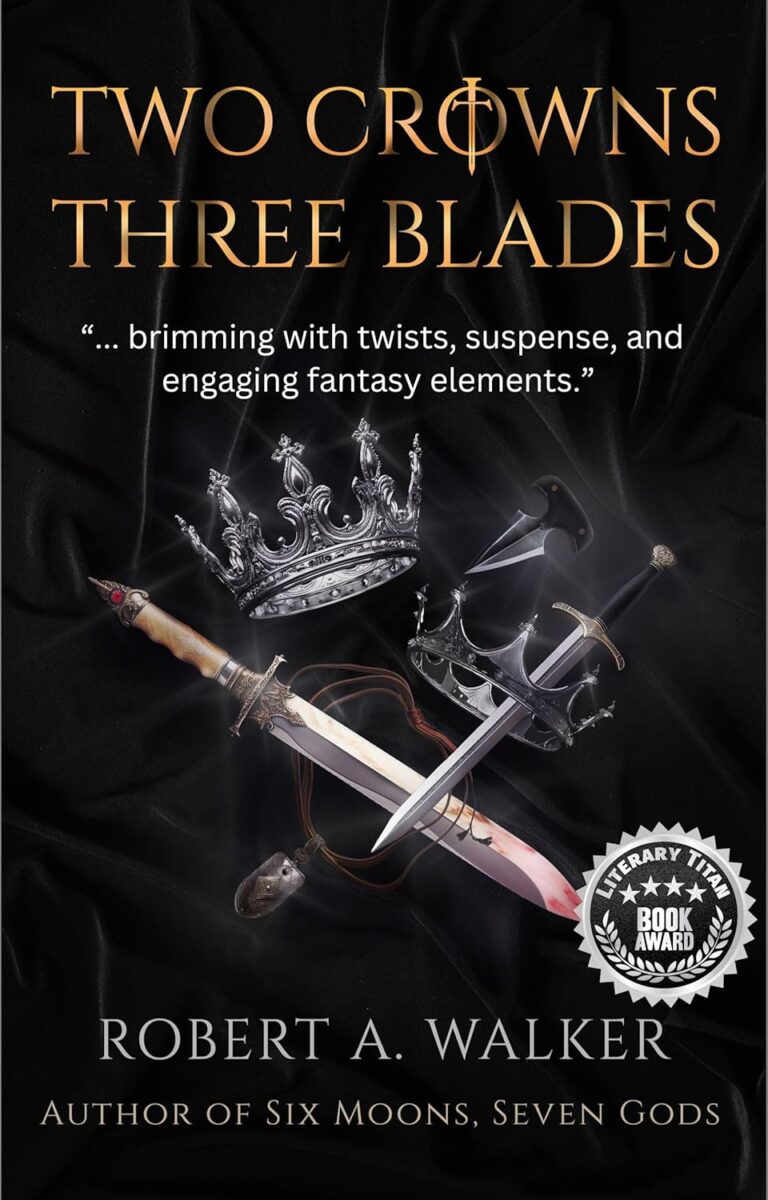 Two Crowns, Three Blades received a 4+ star review, making it an IndieReader Approved title.
Two Crowns, Three Blades received a 4+ star review, making it an IndieReader Approved title.
Following find an interview with author Robert Walker.
What is the name of the book and when was it published?
The name of the book is Two Crowns, Three Blades. It was published April 30, 2025.
What’s the book’s first line?
Some things are worth pursuing even if they don’t exist.
What’s the book about? Give us the “pitch”.
Two Crowns,Three Blades is the second book in The Legend of Baelon series. It’s the sequel to Six Moons, Seven Gods, a medieval fantasy adventure about a kingdom in turmoil and the struggle between good and evil to control it. It’s a story of revenge, dangerous assumptions, and setting wrongs right in a place where loyalty and treachery entwine, friendships are tested, and dangerous secrets are held close to allegiant hearts. Think Camelot meets The Equalizer!
What inspired you to write the book? A particular person? An event?
The inspiration for Two Crowns, Three Blades is firmly rooted in Six Moons, Seven Gods, the first book in The Legends of Baelon series. A number of loose ends at the close of that story were left begging for a sequel. It’s difficult to say what inspired the series itself. I didn’t sit down thinking I’m going to write a fantasy novel. But when I put creative pen to paper, fantasy with tinges of grim dark and romance flowed out. As a young reader, Ian Fleming and Zane Grey were the first to capture my imagination, but the writings of Frank Herbert and J.R.R. Tolkien introduced me to the world of fantasy and were among the most impactful. More recently, I thoroughly enjoyed Scott Lynch’s Gentleman Bastard series. While Fleming and Grey weren’t fantasy authors, they clearly liked to thrill their readers as much as Tolkien or Herbert. No doubt all helped to shape the author in me.
What’s the main reason someone should really read this book?
The main reason would be to immerse one’s self in a world fantastic yet believable, and to see the story unfold through the eyes and minds of well-developed characters, heroes and villains alike.
What’s the most distinctive thing about the main character? Who would you say the character reminds you of?
The book’s main character is Sibil Dunn, the young daughter of a seer left to navigate a cruel world on her own. I’d say her most distinctive trait is her resolute spirit. She suffers a number of terrible losses, and there is so much going on inside her head and heart. At the same time, she’s maturing physically and discovering hidden talents. Getting her complex character right was critical to the overall story’s success, so I couldn’t just gloss over her transformation. She’s a reminder of a number of strong-willed women I’ve had the good fortune to know, and a composite of them all.
What’s the best and the hardest part of being an indie?
The best part of being an indie is the degree of control one maintains; from book cover to blurb and editing, you’re the master of your creation. You can enlist the aid of any profession you choose, but still retain the final say over your production. The hardest part is gaining exposure for your book. It may be worthy of joining the NY Times Bestsellers’ list, but as an indie, you’re going to have difficulty giving it the exposure it deserves (and needs to be commercially successful).
What’s a great piece of advice that you can share with fellow indie authors?
Listen to your heart while you are writing. Mine will generally tell me when I’m on the right track, and when I’ve gotten lost. The characters and scenes that I have been most engaged with during the creative process typically turn out to be those that readers also find most entertaining. So now, when I find myself slogging through some piece that I don’t find particularly exciting or enjoyable to write, I ask myself: why is that? Am I asking the reader to suffer with me? Is there not something I can do to the storyline or character to make writing (and reading) this more enjoyable?
Would you go traditional if a publisher came calling? If so, why?
I would seriously consider it, because the exposure a traditional publisher could give my books might be worth releasing a certain amount of creative license.
Is there something in particular that motivates you (fame? fortune?)
As an author of fiction, I write primarily to entertain, not to educate, inform, or persuade, and I’m honestly not in it for the money (though I’d rather not go broke or sacrifice the grandkid’s Christmas presents for the sake of pursuing book releases, either). So for me, the truest measure of success will always be the degree to which readers enjoy my work. What motivates me is the image of someone curled up in an armchair with a cup of coffee or hot chocolate, immersing themselves in a world that I’ve created—perhaps being brought to laughter or tears, and finishing the book wanting more.
